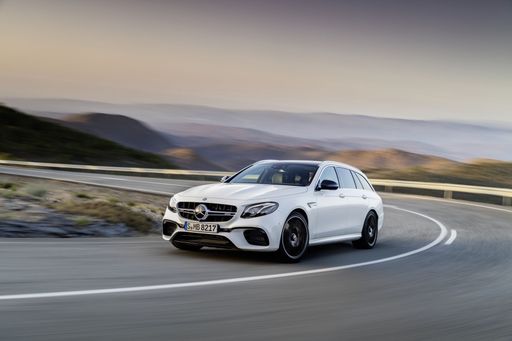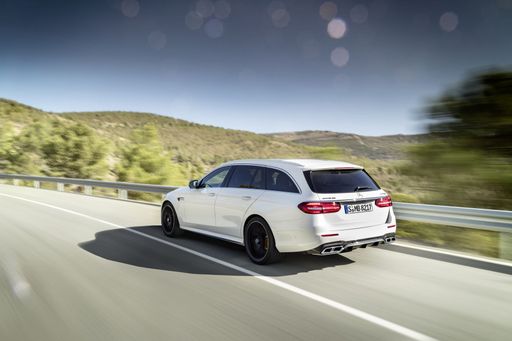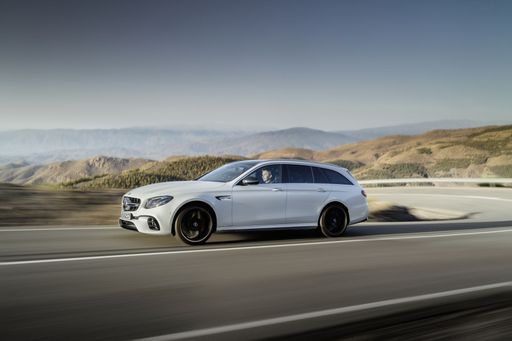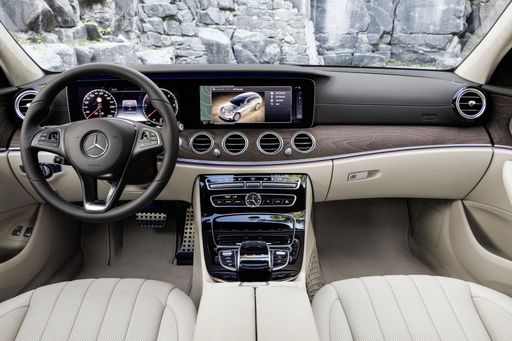Mercedes E Class Wagon vs VW Tiguan - Differences and prices compared
Compare performance (585 HP vs 272 HP), boot space and price (52600 £ vs 33300 £ ) at a glance. Find out which car is the better choice for you – Mercedes E Class Wagon or VW Tiguan?
Costs and Efficiency:
Price and efficiency are often the first things buyers look at. Here it becomes clear which model has the long-term edge – whether at the pump, the plug, or in purchase price.
VW Tiguan has a clearly advantage in terms of price – it starts at 33300 £ , while the Mercedes E Class Wagon costs 52600 £ . That’s a price difference of around 19332 £.
Fuel consumption also shows a difference: VW Tiguan manages with 1.40 L and is therefore evident more efficient than the Mercedes E Class Wagon with 1.70 L. The difference is about 0.30 L per 100 km.
As for electric range, the VW Tiguan performs somewhat better – achieving up to 126 km, about 17 km more than the Mercedes E Class Wagon.
Engine and Performance:
Power, torque and acceleration are the classic benchmarks for car enthusiasts – and here, some clear differences start to show.
When it comes to engine power, the Mercedes E Class Wagon has a significantly edge – offering 585 HP compared to 272 HP. That’s roughly 313 HP more horsepower.
In acceleration from 0 to 100 km/h, the Mercedes E Class Wagon is decisively quicker – completing the sprint in 4.10 s, while the VW Tiguan takes 5.90 s. That’s about 1.80 s faster.
In terms of top speed, the Mercedes E Class Wagon performs hardly perceptible better – reaching 250 km/h, while the VW Tiguan tops out at 242 km/h. The difference is around 8 km/h.
There’s also a difference in torque: Mercedes E Class Wagon pulls convincingly stronger with 750 Nm compared to 400 Nm. That’s about 350 Nm difference.
Space and Everyday Use:
Cabin size, boot volume and payload all play a role in everyday practicality. Here, comfort and flexibility make the difference.
Both vehicles offer seating for 5 people.
In curb weight, VW Tiguan is to a small extent lighter – 1599 kg compared to 1900 kg. The difference is around 301 kg.
In terms of boot space, the VW Tiguan offers barely noticeable more room – 652 L compared to 615 L. That’s a difference of about 37 L.
In maximum load capacity, the Mercedes E Class Wagon performs minimal better – up to 1830 L, which is about 180 L more than the VW Tiguan.
When it comes to payload, Mercedes E Class Wagon slightly takes the win – 645 kg compared to 533 kg. That’s a difference of about 112 kg.
Who comes out on top?
Overall, the Mercedes E Class Wagon shows itself to be leaves the rival little chance and secures the title of DriveDuel Champion.
It convinces with the more balanced overall package and proves to be the more versatile choice for everyday use.

Mercedes E Class Wagon
Costs and Consumption
View detailed analysis
Engine and Performance
View detailed analysis
Dimensions and Body
View detailed analysis
Mercedes E Class Wagon
The E‑Class Estate blends executive elegance with genuine everyday practicality, wrapping luxury materials and a serene ride in a wagon silhouette that never looks apologetic. It’s the perfect choice for buyers who need grown-up luggage space without sacrificing comfort, refinement or a touch of driving enjoyment.
details



VW Tiguan
The VW Tiguan blends sensible family practicality with a dash of German polish, delivering a calm, reassuring ride and a cabin that never feels like an afterthought. For buyers who want an SUV that’s easy to live with yet still nicely dressed, the Tiguan is the grown‑up choice that keeps a cheeky wink in reserve.
details





Costs and Consumption |
|
|---|---|
|
Price
52600 - 121800 £
|
Price
33300 - 51900 £
|
|
Consumption L/100km
1.7 - 7.9 L
|
Consumption L/100km
1.4 - 8.4 L
|
|
Consumption kWh/100km
-
|
Consumption kWh/100km
-
|
|
Electric Range
97 - 109 km
|
Electric Range
118 - 126 km
|
|
Battery Capacity
21.20 kWh
|
Battery Capacity
19.70 kWh
|
|
co2
44 - 181 g/km
|
co2
32 - 190 g/km
|
|
Fuel tank capacity
50 - 66 L
|
Fuel tank capacity
45 - 58 L
|
Dimensions and Body |
|
|---|---|
|
Body Type
Estate
|
Body Type
SUV
|
|
Seats
5
|
Seats
5
|
|
Doors
5
|
Doors
5
|
|
Curb weight
1900 - 2435 kg
|
Curb weight
1599 - 1890 kg
|
|
Trunk capacity
460 - 615 L
|
Trunk capacity
490 - 652 L
|
|
Length
4949 - 4959 mm
|
Length
4539 mm
|
|
Width
1880 mm
|
Width
1842 - 1859 mm
|
|
Height
1469 - 1497 mm
|
Height
1656 - 1658 mm
|
|
Max trunk capacity
1675 - 1830 L
|
Max trunk capacity
1486 - 1650 L
|
|
Payload
540 - 645 kg
|
Payload
460 - 533 kg
|
Engine and Performance |
|
|---|---|
|
Engine Type
Petrol MHEV, Plugin Hybrid, Diesel MHEV
|
Engine Type
Petrol, Petrol MHEV, Diesel, Plugin Hybrid
|
|
Transmission
Automatic
|
Transmission
Automatic
|
|
Transmission Detail
Automatic Gearbox
|
Transmission Detail
Dual-Clutch Automatic
|
|
Drive Type
All-Wheel Drive, Rear-Wheel Drive
|
Drive Type
All-Wheel Drive, Front-Wheel Drive
|
|
Power HP
186 - 585 HP
|
Power HP
130 - 272 HP
|
|
Acceleration 0-100km/h
4.1 - 8.8 s
|
Acceleration 0-100km/h
5.9 - 10.6 s
|
|
Max Speed
213 - 250 km/h
|
Max Speed
210 - 242 km/h
|
|
Torque
320 - 750 Nm
|
Torque
220 - 400 Nm
|
|
Number of Cylinders
4 - 6
|
Number of Cylinders
4
|
|
Power kW
137 - 430 kW
|
Power kW
96 - 200 kW
|
|
Engine capacity
1993 - 2999 cm3
|
Engine capacity
1498 - 1984 cm3
|
General |
|
|---|---|
|
Model Year
2024 - 2025
|
Model Year
2024 - 2025
|
|
CO2 Efficiency Class
G, E, F, B, D
|
CO2 Efficiency Class
G, D, E, F, B
|
|
Brand
Mercedes-Benz
|
Brand
VW
|
What drivetrain options does the Mercedes E Class Wagon have?
The Mercedes E Class Wagon is offered with All-Wheel Drive or Rear-Wheel Drive.




